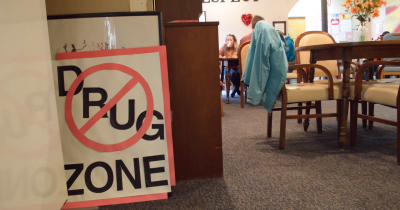Forfeiture Funds to Fight Addiction at the S.O.U.R.C.E

The lobby of 1166 Main Street is a welcoming space filled with tables and chairs, stacks of donuts and the sound of laughter. Some people play cards while others lounge in chairs and read. Standing in the back with a pot of coffee is Pattie Beck, board treasurer for the S.O.U.R.C.E. This is her family—and her source of recovery.
For 10 years, the S.O.U.R.C.E. (the Service-Center Offering Understanding, Recovery, Community, and Encouragement) has been a beacon of hope for recovering addicts and alcoholics seeking a new way of life.
“Some of the best recovery takes place with one addict helping another over a cup of coffee,” says Beck, who has been clean for 10 years. “People usually feel very ashamed. They need a place to come and talk to other addicts and alcoholics suffering from the disease.”
According to the National Survey on Drug Use and Health, 22.6 million people (9.2% of the U.S. population ages 12 and older) have an alcohol or drug-related problem and 50% of adults have a family member with alcoholism.
These statistics are real for individuals like Molly, who credits the S.O.U.R.C.E as a major factor in her own recovery. Today she has been clean for four years and she’s grateful.
“Jails or institutions or death would be exactly where I would have been,” she says, drawing a new hand of cards. “This has given me new faith in myself and hope.”
In 2009 the Dubuque Drug Task Force (DDTF), which is comprised of members of the Dubuque County Attorney’s Office, Dubuque County Sheriff’s Office and the Dubuque Police Department, received a sizeable asset forfeiture award based on a multi-state, illegal prescription drug investigation that was initiated by the DDTF at a Dubuque pharmacy.
When Nancy Van Milligen, president and CEO of the Community Foundation of Greater Dubuque heard this news, she wondered if the S.O.U.R.C.E. could be a potential beneficiary of the funds.
“When we first heard of the forfeiture funds back in 2009, the S.O.U.R.C.E. made perfect sense to me as a potential recipient of some of the dollars,” she says. “I contacted then-Chief of Police Kim Wadding and we worked long and hard with the Dubuque Drug Task Force to see if any of those funds could be directed towards the S.O.U.R.C.E.”
Initially, these efforts were stalled by restrictive guidelines on the use of forfeiture funds.
According to Dubuque Chief of Police Mark Dalsing, who picked up the project after becoming Chief in 2010, the primary and traditional designation is for direct law enforcement benefit, so finding a way to direct a portion of the funds to fighting addiction at the S.O.U.R.C.E. came with challenges.
“When you spend forfeiture funds, there are very specific guidelines on how they can be spent,” says Dalsing. “But we kept talking it over the next few years to see if there was a way we could do something, and we eventually identified provisions that allow for supporting drug abuse treatment and prevention programs.” Although the opportunity to use the original forfeiture funds expired based on guideline restrictions, the DDTF identified other forfeiture funds to complete the project.
According to Van Milligen, this donation illustrates an important role of the Community Foundation as a connector, bringing people and organizations together for creative solutions.
“I think community foundations have their best days when they use all their resources, whether it be their assets, their relationships, or their ability to convene,” says Van Milligen. “These dollars aren’t going to a fund at the Foundation; we just brought people together to make the gift possible. I am pleased that we were able to facilitate this gift in support of the S.O.U.R.C.E., as they are doing wonderful work in our community.”
Dalsing agrees that the money is going to a good cause.
“We know that by helping the S.O.U.R.C.E. keep its doors open, we’re going to help people stay in recovery. And if people are in recovery, they’re less apt to get involved in criminal activity,” he says. “Places like the S.O.U.R.C.E. provide long-term recovery and healing as opposed to short-term, traditional law enforcement responses such as incarceration or hospitalization.” Dalsing noted, “We aren’t doing this for the thanks, we’re doing it to help people succeed.”
The S.O.U.R.C.E. will be reimbursed for its operating expenses over the next year, or until the $10,000 is expended.
“I believe that it has come full circle,” says Molly with a smile. “The very thing that was used when we were out in the world—we can turn this around to something to support us right at the bottom line and right at the very base level of the disease.”
To learn more about the S.O.U.R.C.E., contact Board President Dorothy Schlueter at 563.588.2700 or Board Treasurer Pattie Beck at 563.590.5760.